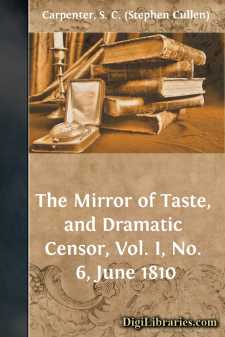Categories
- Antiques & Collectibles 13
- Architecture 36
- Art 48
- Bibles 22
- Biography & Autobiography 813
- Body, Mind & Spirit 138
- Business & Economics 28
- Children's Books 12
- Children's Fiction 9
- Computers 4
- Cooking 94
- Crafts & Hobbies 4
- Drama 346
- Education 46
- Family & Relationships 57
- Fiction 11821
- Games 19
- Gardening 17
- Health & Fitness 34
- History 1377
- House & Home 1
- Humor 147
- Juvenile Fiction 1873
- Juvenile Nonfiction 202
- Language Arts & Disciplines 88
- Law 16
- Literary Collections 686
- Literary Criticism 179
- Mathematics 13
- Medical 41
- Music 40
- Nature 179
- Non-Classifiable 1768
- Performing Arts 7
- Periodicals 1453
- Philosophy 64
- Photography 2
- Poetry 896
- Political Science 203
- Psychology 42
- Reference 154
- Religion 505
- Science 126
- Self-Help 81
- Social Science 81
- Sports & Recreation 34
- Study Aids 3
- Technology & Engineering 59
- Transportation 23
- Travel 463
- True Crime 29
The Mirror of Taste, and Dramatic Censor, Vol. I, No. 6, June 1810
Categories:
Description:
Excerpt
THE ROMAN DRAMA.
In proportion as the Romans yielded to the habit of imitating the Greeks, they advanced into refinement, and receded from their characteristic roughness and ferocity. Their pace, however, was very slow, for imagining rudeness and brutality to be synonimous with independence, they indulged and prided themselves in an adherence to their original coarseness and despised the manners of the Grecians, as the latter did those of the Persians, for their extreme refinement and effeminacy. Of the drama there is not to be found a trace on the records of Rome till more than three hundred and fifty years after the building of the city. The people had revels and brutal debauches at which rude compositions filled with raillery and gross invective were sung, accompanied with indecent action and lascivous gestures. But the raillery they used was so personal and calumnious that riots constantly ensued from the resentment of the injured parties, in consequence of which the senate passed a law, in the three hundred and second year of the city, condemning to death any person who should injure the reputation of his neighbour.
It was a full century after that law when, on occasion of great public calamity, they, in order to appease the divine wrath instituted feasts in honour of the gods, and those feasts for the first time exhibited a sort of irregular theatrical performances, composed wholly of imitation. The actors in those may in all probability be placed on a level with those called Mummers in Great Britain, and Livy describes them as Balladines who travelled to Rome from Tuscany. Though their merit could not have been great, they were very much applauded. Applause produced improvement, and they soon formed themselves into companies called histrioni, who performed regular pieces called satires. These, which were at best entitled to no higher rank than bad farces, kept exclusive possession of the public regards for a hundred and twenty years.
It was at the end of that period, and about two hundred and forty years before the Christian æra that the first play performed after the manner of the Greeks, was brought forward in Rome, by Livius Andronicus, the earliest of the Roman dramatic poets. He turned the personal Satires and Fescenine verses so long the admiration of the Romans, into regular form and dialogue, and though the character of a player, so long valued and applauded in Greece, was reckoned vile and despicable among the Romans, Andronicus himself acted a part in his dramatic compositions. At the time of Cicero the works of this poet were obsolete; yet some passages of them are preserved in the Corpus Poetarum.
It is related of Livius Andronicus that he at first formed and sung his pieces in the manner of his predecessors, despairing of being able to accomplish any improvement in the Roman theatre, but that one day being surrounded by the multitude and excessively fatigued, he called a slave to relieve him while he recovered his breath. Displeased with the bungling manner in which the slave performed this new task, Livius rebuked him very severely, the slave justified, the master replied, and a dialogue ensued which the spectators imagining to be a part of the plan of the piece, greatly applauded....





